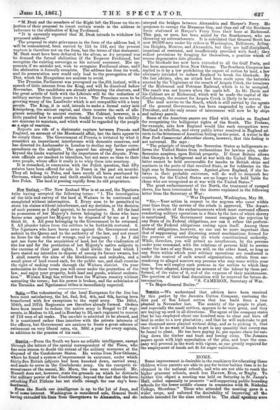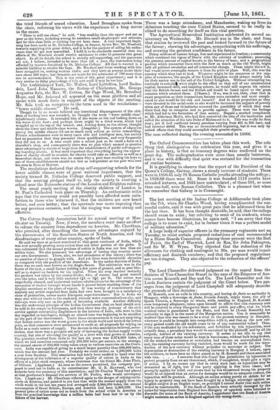HOME.
Some improvement is desirable in the machinery for educating those children whose parents are able to pay for better tuition than is to be obtained in the national schools, and who are not able to reach the higher grammar schools, much less Harrow, Eton, or Rugby. To further this object a meeting was held on Saturday in St. James's Hall, called especially to promote " self-supporting public boarding schools for the lower middle classes in connexion with St. Nicholas College, Shoreham." Those who attended the meeting gave it a wider scope, and enforced the desirability of improving all the schools intended for the class referred to. The chief speakers were
the chair, enforcing his views with the experience of a long career in the cause.
" There is still one class," he said, " less wealthy than the upper and not as poor as the lower, including among its numbers small shopkeepers and artisans, and for this class little or nothing has yet been done. A very important begin- ning has been made at St. Nicholas College, in Sussex. by the Rev. Mr. Woodard, towards supplying this great defect, and it is for the purpose of aiding his endea-
vours that we are now assembled. I held it to be absolutely essential that the
efforts of Mr. Woodard should receive assistance in order to promote this great object. In all its details the school is strictly self-supporting, and the payments are not, I believe, intended to be more than 131. a year, the instruction being afforded by masters furnished by St. Nicholas College. All that is wanted is a suitable building to receive the boys. Mr. Woodard and those working with him have struggled on, making various shifts, and they have at present under their care about 300 boysbut demands are made for the admission of 700 more than can be accommodated. This is the crisis of this great experiment; and it is very unwise to delay proceedings of this sort until it may be too late." The Archbishop of York, Mr. Walter, Lord Lyttelton, Lord Redes. dale, Lord John Manners, the Bishop of Chichester, Mr. George Augustus Sala, the Rev. W. Cotton, Sir Page Wood, Mr. Beresford Hope, and Mr. Ackroyd all appeared on the same platform and all spoke with much force in support of the objects of the meeting. Mr. Sala took an exception to the term used in the resolutions- " lower middle classes." He said,
Though he by no means believed any intentional disparagement of the chil- dren of working men was intended, he thought the term " lower middle class"
injudiciously chosen. It reminded him of the worm on the leaf looking down on the worm in the dust ; and perhaps there might be a third worm, which had wriggled up to the top of the branch, and, looking down on the others, thought them the lower and middle class worms. (Laughter.) The system of education among the middle classes did not so much need, reform as entire remodelling. Private schoolmasters were in many cases able and intelligent men, but society
had no guarantee that they possessed these qualifications, and very frequently they did not do so. A man could take a schooljust as he could a farm or a chandler's shop, and consequently there was no plan which seemed to promise more advantages to society at large than the establishment of public self-support- ing boarding schools. It was most important that everything having the appear ance of charity should be avoided, for charity could take an offensive as well as a benevolent shape, and there was no reason why a poor man sending his boys to one of these establishments should not feel as independent as the peer who sent his sons to Eton or Harrow.
The resolutions declared that cheap self-supporting schools for the lower middle classes were of great national importance, that the society termed St. Nicholas College deserved public support, and
that the meeting pledged itself to help the society in erecting a school near the Balcombe station of the London and Brighton railway. The usual yearly meeting of the charity children of London in St. Paul's Cathedral took place on Thursday. An enthusiastic critic
says that the ceremony could not possibly have afforded more satis- faction to those who witnessed it, that the children are now heard better, and seen better ; that the spectacle was more hnposing than on any previous occasion, and that the singing was more steady and effective.































 Previous page
Previous page